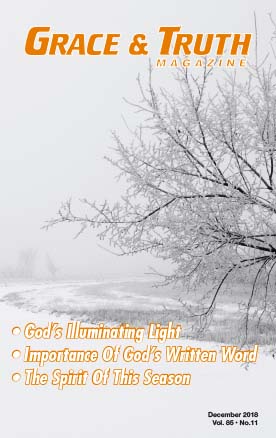
By Roger Penney
The above words, found in Genesis 1:3 (KJV), are the first recorded spoken ones of God, and as such they are highly significant concerning God’s plans for the world and His people. They also tell of the nature and character of God, as seen in what John wrote: “God is light and in Him is no darkness at all” (1 Jn. 1:5).
The Nature Of God
Light is the very essence of God’s being. It is difficult for us to imagine the Supreme Being, who has the purest, uncreated and infinite energy, but the Bible says God is precisely that One. There is no darkness in Him; He is all pure light, just and holy, yet gracious. The book of Hebrews tells us, “It is impossible for God to lie” (6:18). He, the Lord Jesus, is the ultimate and final Truth, and He said, “I am the way, the truth and the life” (Jn. 14:6). This One who “cannot lie” (Ti. 1:2) also said, “I am the light of the world: He that followeth Me shall not walk in darkness, but shall have the light of life” (Jn. 8:12).
“God is light” is an absolute and unconditional statement, and the verses we quoted in John show quite clearly that the Lord Jesus is God. God, remember, is a trinity – often referred to as “the Godhead.” Later in the New Testament, Paul stated that the Lord Jesus has and is the fullness of God (Col. 1:19, 2:9).
In our present situation and bodies of humiliation it would be impossible for us to exist in God’s presence, for such is the intensity of the light of God. We are in fragile and sinful bodies, but one day soon these bodies of ours are to be transformed. In heaven we will have glorious bodies, “like unto His glorious body” (Phil. 3:21).
The Effects Of The Light
His true light will be revealed, yet at present that light is shining in the darkness of human hearts and minds, dispelling ignorance and vice. Such is the work of Him who is the true Light.
At the beginning of John’s gospel we are told that the “light shineth in darkness, and the darkness comprehended [overcame] it not” (Jn. 1:5). The prophetic words of the Lord Jesus just prior to the healing of the blind man are significant concerning His task then and now. He told His disciples, “I must work the works of Him that sent Me, while it is day: the night cometh, when no one can work” (9:4-5).
Then, after His resurrection and the coming of the Holy Spirit, the light continued to shine in the hearts and minds of men, dispelling the confusion, dissatisfaction and lies. This has been done by the gospel and the power of the Spirit of God. “But if our gospel is hid, it is hid to them that are lost: In whom the god of this world hath blinded the minds of them which believe not, lest the light of the glorious gospel of Christ, who is the image of God, should shine unto them” (2 Cor. 4:3-4).
Just as God decreed that there be light in creation, dispelling the primeval darkness and chaos, so the same process occurs in the human hearts and minds by the gospel. Paul explained to the Corinthians, “For God who commanded the light to shine out of darkness, hath shined in our hearts, to give the light of the knowledge of the glory of God in the face of Jesus Christ” (v.6).
The face of Moses shone after being with God on the mountain (Ex. 34:29), but the Lord Jesus is the actual Light, shining all the time since He is God and is ever with God the Father (2 Pet. 1:19). Now, as a result of our learning about the Lord Jesus and getting to know Him, we shine as lights in this dark world (Phil. 2:15).
The Dominance Of The Light
The light is universal and dispels all the satanically imposed darkness. John stated that we are of God, but this world is under the control of Satan: the Wicked One (1 Jn. 5:19).* The apostle continued, “And we know that the Son of God is come, and hath given us an understanding, that we may know Him that is true, and we are in Him that is true, even in His Son, Jesus Christ. This is the true God, and eternal life” (v.20).
Isaiah described how the Lord Jesus conquers the satanic darkness of this world. It is by shining His light and causing it to reflect from His people, who have experienced living in the darkness and are now set free. “Nevertheless the dimness shall not be such as was in her vexation [distress], when at first He lightly afflicted the land of Zebulun and the land of Napthali, and afterward did more grievously afflict her by the way of the sea, beyond Jordan, in Galilee of the nations. The people that walked in darkness have seen a great light: they that dwelt in the land of the shadow of death, upon them has the light shined” (Isa. 9:1-2).
“The people” were of Galilee. The Pharisees and other learned men despised them, saying with contempt, “This people who knoweth not the law are cursed” (Jn. 7:49). Nicodemus argued with the educated men, but then they taunted him, suggesting that he too was a Galilean. Compounding their display of ignorance, they declared that no prophet ever arose from Galilee (v.52). Clearly they did not count John the Baptist as a prophet, although he was, as well as the Lord Jesus – both of whom had come from Galilee.
The Lord spent much time with the people of that region. They were specially privileged and chosen to be the bearers of the light to the nations after His resurrection. He taught in their synagogues, performed miracles in their towns and villages, and instructed them by the lakeside. Note that we carry the same light as has been done by generation after generation of the Lord’s people.
We see later that men of Galilee and others of despised occupations, such as a tax collector, were to take the gospel all over the world. Faithful men and women are still engaged in this work worldwide. These dear servants of the Lord Jesus are seldom from the upper classes of society, but they fulfil the means God uses according to His will. Paul explained to the Corinthians, “For ye see your calling, brethren, how that not many wise men after the flesh, not many mighty, not many noble, are called: But God hath chosen the foolish things of the world to confound the wise; and God hath chosen the weak things of the world to confound the things which are mighty; and base things of the world, and things which are despised, hath God chosen, yea, and things which are not, to bring to nought things that are: that no flesh should glory in His presence. But of Him are ye in Christ Jesus who of God is made unto us wisdom, and righteousness, and sanctification, and redemption: that, according as it is written, He that glorieth, let him glory in the Lord” (1 Cor. 1:26-31).
The Lord Jesus is the Light of the World. This great message was first entrusted to the men of Galilee, then after to those who heard it. Now, when the world is in darkness spiritually, the same message is committed to us. The Lord said to His disciples “Ye are the light of the world” (Mt. 5:14). It is only a reflected light, but nevertheless a reflection of the true Light.
The Darkness And A False Light
Isaiah told about a world without light. It is a world where all the peoples are shrouded in gross darkness, but where there is hope for the true Light. He wrote: “Arise, shine; for thy light is come, and the glory of the LORD is risen upon thee. For, behold, the darkness shall cover the earth, and gross darkness the people: but the LORD shall arise upon thee, and His glory shall arise upon thee. And the Gentiles [nations] shall come to thy light, and kings to the brightness of thy rising” (Isa. 60:1-3). This prophecy is a call to the faithful remnant of Israel to shine for the Lord Jesus, for He also is about to arise and shine to defeat forever the darkness and its power. It is also a prophecy that has as its fulfillment all peoples at all times who are called to be witnesses for Him.
At this present time Satan is mustering his forces for the takeover of this world by the Antichrist. The Devil even has some success in confusing and leading astray God’s people. He does this by changing himself into the appearance of an angel of light (2 Cor. 11:14). We are not ignorant of his devices, yet we need to be reminded. Therefore Paul warned the Corinthians about false apostles and deceitful workers who were then and are now “transforming themselves into the apostles of Christ … Therefore it is no great thing if his [Satan’s] ministers also be transformed as the ministers of righteousness” (2 Cor. 11:13,15).
God is at work, so Satan also puts his servants to work to subvert things and the Word of God. However, we have all the resources of God through the Holy Spirit and the power of the Lord Jesus. “For God, who commanded the light to shine out of darkness, hath shined in our hearts, to give the light of the knowledge of the glory of God in the face of Jesus Christ” (4:6).
Evil And The Evil Ones To Be Destroyed By The Light
One day soon the forces of darkness and evil are to be burned up. “For, behold, the day cometh, that shall burn as an oven; and all the proud, yea, and all that do wickedly, shall be stubble: and the day that cometh shall burn them up, says the Lord of hosts” (Mal. 4:1, see Zech. 14:12). The Antichrist himself shall be burned up by the very brightness of the Lord’s presence. “Rest with us, when the Lord Jesus shall be revealed from heaven with His mighty angels, in flaming fire taking vengeance on them that know not God; and that obey not the gospel of our Lord Jesus Christ: who shall be punished with everlasting destruction from the presence of the Lord, and from the glory of His power” (2 Th. 1:7-9). In the following chapter of Paul’s letter we read that not just the forces of evil are to be destroyed, but the very person who has ruled the world blasphemously as Satan’s representative is also to be destroyed. “And then shall the Wicked be revealed, whom the Lord shall consume with the spirit of His mouth, and shall destroy with the brightness of His coming” (2 Th. 2:8; See also Mal. 3:2; Rev. 19:15).
Just And Righteous Judgment By The Just And Righteous Judge
In Revelation the Lord Jesus is depicted having “eyes … as a flame of fire” (1:14). John’s vision began with his being suddenly confronted by such a wonderful and majestic personage that he was led to write: “And when I saw Him, I fell at His feet as dead” (v.17). His description includes “His voice as the sound of many waters. And He had in His right hand seven stars; and out of His mouth went a two-edged sword: and His countenance was as the sun shineth in his strength” (vv.15-16). This describes the Lord Jesus when He will come to judge the nations. “Behold, He cometh with clouds; and every eye shall see Him, and they also which pierced Him; and all kindreds of the earth shall wail because of Him. Even so, Amen!” (v.7). The sword is that of the warrior who is bringing judgment to His enemies. The “eyes … as a flame of fire” tell us that He sees all things, including the secrets of the heart and the thoughts of intellects bound and perverted by Satan and the demon hordes.
We see in the prophets the Messiah coming in power, but in the New Testament the fact of the Lord Jesus as the Judge of all is clearly explained. “For the Father judgeth no man, but hath committed all judgment unto the Son: that all men should honour the Son, even as they honour the Father” (Jn. 5:22-23). This is stressed time and again in this passage. It goes on to say, “Verily, verily [Truly, truly], I say unto you, The hour is coming, and now is, when the dead shall hear the voice of the Son of God: and they that hear shall live. For as the Father has life in Himself: so hath He given to the Son to have life in Himself; and hath given Him authority to execute judgment also, because He is the Son of Man” (vv.25-27). The Lord Jesus went on to say, “As I hear, I judge: and My judgment is just; because I seek not My own will, but the will of the Father which hath sent Me” (v.30).
We see in Paul’s first letter to the Corinthians that the Lord Jesus will judge the works of His people and reward them, or not, accordingly (3:10-15). Later, the promise to the world is that all men will be judged according to how they have responded to God’s message. Paul told the people of Athens, “And the times of this ignorance God winked at; but now commandeth all men every where to repent: because He hath appointed a day, in the which He will judge the world in righteousness by that Man whom He hath ordained whereof He has given assurance unto all men, in that He hath raised Him from the dead” (Acts 17:30-31).
The Lord Jesus will rule the world in righteousness as well as conduct the final tribunal. That terrible event is again prophesied in Revelation where John described it in all its terror and despair: “And I saw a great white throne, and Him that sat on it, from whose face the earth and the heaven fled away; and there was found no place for them. And I saw the dead, small and great, stand before God; and the books were opened: and another book was opened, which is the book of life: and the dead were judged out of those things which were written in the books, according to their works. And the sea gave up the dead which were in it; and death and hell delivered up the dead which were in them: and they were judged every man according to their works. And death and hell were cast into the lake of fire. This is the second death“ (20:11-14).
In view of these things, may we truly ponder God’s first recorded words: “Let there be light.”
ENDNOTE
* The term “wickedness,” as found at the end of this verse in some Bibles, is not an accurate translation of the Greek.








